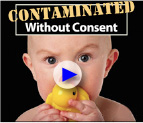March 30, 2012
Toxic BPA: FDA Rejects NRDC Request to Remove BPA From Food Supply
Environmental Health Advocates Demand More Protection
Bisphenol A linked to obesity, reproductive and other endocrine illness, cancer
Washington, DC — The Food and Drug Administration (FDA) made an announcement today responding to a petition from the Natural Resources Defense Council (NRDC) to prohibit BPA use as a food additive. FDA has stated it will not ban BA. FDA has stated it will not ban BA. The Wall Street Journal has reported that FDA says it “lacks scientific information” to restrict the chemical.
As part of a court ordered agreement that resulted when NRDC sued FDA for failure to respond to their petition, the decision must include a final evaluation of BPA safety.
“Obesity, diabetes, thyroid disease and cancer are all associated with endocrine disrupting chemicals such as BPA. We can prevent this exposure by doing what so many other countries have done, and ban it from products related to food,” comments Cindy Luppi from Clean Water Action, New England.
“The chemical industry claims that the amounts of BPA that people are exposed to are ‘safe.’ The fact that the Centers for Disease Control and Prevention (CDC) has documented that over 90% of all Americans have BPA in our bodies, and the fact that the chemical is thought not to stay in the body for very long, means we are being exposed over and over again.” explains Anne Hulick, Coordinator, Coalition for a Safe and Healthy Connecticut.
"State legislatures around the country are years ahead of the federal government on BPA. Because of health concerns and a strong demand from consumers, states have taken, and will continue to take, swift action to protect their citizens from BPA, said Sarah Doll, national director for SaferStates. "Eleven states have already passed policies to restrict the use of BPA in food and beverage containers and additional policies are pending in numerous state houses. So while the FDA continues to delay much-needed action, many states will continue to show BPA the door.
“The next decision the FDA should make is to remove ‘responsible for protecting the public health’ from its mission statement,” said Jane Houlihan, Scientist and Senior Vice President for Research of the Environmental Working Group. “It’s false advertising. Allowing a chemical as toxic as BPA, and linked to so many serious health problems, to remain in food means the agency has veered dangerously off course.”
"As a nurse who sees chronic diseases and disorders linked to BPA exposure, I strongly believe in using the best available science to protect human health. The FDA had a golden opportunity to use sound science to protect Americans from a dangerous chemical and restore the public trust. Instead, they caved to industry pressure and squandered that opportunity,” comments Katie Huffling, MS, RN, CNM Director of Programs, Alliance of Nurses for Healthy Environments.
“The shift away from BPA in the marketplace has actually created economic growth as seen with the expansion of companies like Owens-Illinois, a multinational glass company that has had to step up hiring and production to meet the need for safer BPA-free glass baby bottles,” adds Mike Schade from Center for Health, Environment and Justice. “And even BPA maker Sunoco has changed its policy and won’t even sell BPA to manufacturers whose products can expose BPA to children. Phasing out BPA is a win for our health, and a win for greener jobs and a greener economy”
“FDA has had access to the copius amounts of new science documenting links to adverse health impacts from BPA exposure,” says Daniella Russo, Co-founder and Executive Director with the Plastics Pollution Coalition. “Is industry influence creating a delay in FDA moving forward to protect the public? The longer they delay, the more people will suffer from adverse health impacts of this chemical.”
"This is just another example of how the public cannot rely on its government agencies to be ahead of the curve in carrying out their mandate to protect the population, not least of whom are the most vulnerable of us, infants and the developing fetus,” adds Lin Kaatz Chary, PhD, MPH, with the Indiana Toxics Action.
“Today’s decision by the U.S. FDA is deeply disappointing. The growing body of science shows us there is cause for concern about exposure to this hormone-disrupting chemical and by refusing to ban BPA in food packaging, the agency has caved to industry pressure at the expense of the American public," adds Kathleen Schuler, Senior Policy Analyst at the Institute for Agriculture and Trade Policy, co-director of Healthy Legacy.
"Consumers may be driving a market shift for non-BPA bottles and packaging but the fact remains that low income folks are still disproportionately exposed to BPA. Especially for states like Kentucky that haven't yet taken decisive action on BPA to protect our residents, federal regulations should do that job. We need to trust the safety of the products we buy in stores," said Monica Unseld, Ph.D, member of the Kentucky Environmental Foundation.
Eric Uram of SafeMinds indicates, “Chemicals like bisphenol A can affect development even before birth, because of this it needs to be withdrawn from use by the FDA. Safer alternatives to BPA exist, and improved alternatives can be developed. SafeMinds seeks the end of these threats to our children’s future health and welfare."
FDA has responded to a 2011 American Chemistry Council petition to ban BPA from baby bottles and sippy cups by opening up that petition for public comment just last month. FDA has never asked for public comment on the 2008 NRDC petition and has never responded as required by law to the petition.
FDA had triggered a Congressional investigation in 2008 when they used documents from the 1970’s provided by independent contractor ICF, a consulting firm that, at the time, represented BPA manufacturers. The documents were produced by Dow Chemical and addressed two studies, which formed the basis for the previous FDA approval of BPA.
Other BPA manufacturers such as Eastman Chemicals, even though they are still making the synthetic sex hormone, are also making a BPA “alternative,” Tritan, and many manufacturers are marketing their products made with Tritan as being “BPA-free.”
Environmental health advocates are demanding that FDA take a stand and refuse industry influence and remove BPA exposure from the marketplace.
Available for Interviews
- Lin Kaatz Chary, PhD, MPH, Indiana Toxics Action, Indiana Toxics Coalition 219-938-0209. Lin can address the growing field of Green Chemistry as companies search for less toxic substitutions to chemicals such as BPA.
- Sarah Doll, National Director, SAFERStates, 503-522-6110. Sarah can detail the efforts of individual states on restricting BPA.
- Jane Houlihan, Senior Scientist and Vice President for Research of the Environmental Working Group. To speak with Jane, contact Alex Formuzis, 202-939-9140. Jane can address scientific studies linking BPA to adverse health impacts.
- Katie Huffling, RN, MS, CNM, Director of Programs, Alliance of Nurses for Healthy Environments (ANHE), 410-706-1778. Katie can address the growing awareness about endocrine disrupting chemicals such as BPA among the health care professionals community.
- Anne Hulick, Coordinator, Coalition for a Safe and Healthy Connecticut, 860-232-6232 860 302-4861. Anne can address efforts in her state to restrict BPA.
- Cindy Luppi, Clean Water Action New England Director 617-338-8131, x208-617 640-2779. Cindy has helped lead successful efforts with Clean Water Action to phase out BPA in varied products from baby bottles and sippy cups to thermal receipt paper in a number of states including California, Connecticut, Massachusetts, and Minnesota, and can address efforts in those states as well as market shifts.
- Daniella Dimitrova Russo, Co-founder and Executive Director Plastic Pollution Coalition, 415-513-309 (m) 415-608-6423. Daniella will talk about the crisis in plastics pollution that is also creating ubiquitous BPA exposure in seas and landfills.
- Mike Schade, PVC Campaign Coordinator Center for Health, Environment & Justice (CHEJ) 212-964-3680. Mike has been involved with market campaigns around BPA and can address the shifts with baby bottle manufacturers and retailers in response to environmental health concerns about BPA.
- Kathleen Schuler, Senior Policy Analyst at the Institute for Agriculture and Trade Policy, co-director of Healthy Legacy (m) 612-382-5917.
- Eric Uram, Executive Director, SafeMinds, 404-934-0777.
Resources
For a list of scientific and product testing studies and general media assistance, contact Stephenie Hendricks, 415 258-9151, Steph@SafeMarkets.org.
- FDA's Letter to NRDC
- Baby’s Toxic Bottle
- Breast Cancer Fund’s “Cans Not Cancer” Campaign
- Consumer’s Union Report on BPA in Canned Food
- Exploding Industry’s BPA Myths
- Green Century Fund’s Report on Companies’ Use of BPA in Packaging
- NRDC (Sarah Janssen’s Switchboard Blog)
- No Silver Lining, An Investigation into Bisphenol A in Canned Foods
# # #




